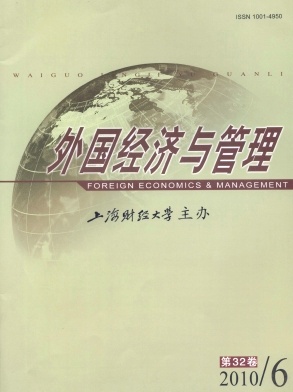企业孵化器研究前沿与突破方向探析
外国经济与管理 2010 年 第 32 卷第 06 期, 页码:17 - 22
摘要
参考文献
摘要
企业孵化器研究已经取得了长足的进展,但是,各研究分支发展并不平衡,有的分支甚至成了孵化器研究和实践发展的瓶颈。为了锁定并分析这些瓶颈,本文在梳理已有研究文献的基础上,探析了孵化器各研究分支的最新前沿,梳理了它们的研究脉络和推进路径;最后通过剖析孵化器研究瓶颈领域的研究现状来探寻造成研究瓶颈的原因,并提出了突破研究瓶颈的思路。
[1]Hackett,S M,and Dilts,D M.A systematic review of business incubation research[J].Journal of Technology Transfer,2004,29(1):55-82.
[2]Phan,P H,Siegel,D S,and Wright,M.Science parks and incubators:Observations,synthesis and future research[J].Journal ofBusiness Venturing,2005,20(2):165-182.
[3]张锡宝.网络型孵化器及其对我国科技孵化器发展的启示[J].科技管理研究,2007,27(9):67-68.
[4]O’Neal,T.Evolving a successful university-based incubator:Lessons learned from the UCF technology incubator[J].EngineeringManagement Journal,2005,17(3):11-25.
[5]Bergek,A,and Norrman,C.Incubator best practice:A framework[J].Technovation,2008,28(1-2):20-28.
[6]Lyons,T S.Building social capital for rural enterprise development:Three case studies in the United States[J].Journal of Develop-mental Entrepreneurship,2002,7(2):193-216.
[7]Peters,L,Rice,M,and Sundararajan,M.The role of incubators in the entrepreneurial process[J].Journal of Technology Transfer,2004,29(1):83-91.
[8]Siegel,D S,Westhead,P,and Wright,M.Assessing the impact of university science parks on research productivity:Exploratoryfirm-level evidence from the United Kingdom[J].International Journal of Industrial Organization,2003,21(9):1 357-1 369.
[9]Hansson,F,Husted,K,and Vestergaard,J.Second generation science parks:From structural holes jockeys to social capital cata-lysts of the knowledge society[J].Technovation,2005,25(9):1 039-1 049.
[10]Rothschild,L,and Darr,A.Technological incubators and the social construction of innovation networks:An Israeli case study[J].Technovation,2005,25(1):59-67.
[11]Rice,M P.Co-production of business assistance in business incubators:An exploratory study[J].Journal of Business Venturing,2002,17(2):163-187.
[12]Kihlgren,A.Promotion of innovation activity in Russia through the creation of science parks:The case of St.Petersburg(1992-1998)[J].Technovation,2003,23(1):65-76.
[13]Oh,D.Technology-based regional development policy:Case study of Taedok Science Town,Taejon Metropolitan City,Korea[J].Habitat International,2002,26(2):213-228.
[14]范秀成,张彤宇.顾客参与对服务企业绩效的影响[J].当代财经,2004,(8):69-73.
[15]Schwartz,M,and C Hornych.Specialization as strategy for business incubators:An assessment of the Central German MultimediaCenter[J].Technovation,2008,28(7):436-449.
[16]Rothaermel,F T,and Thursby,M.University-incubator firm knowledge flows:Assessing their impact on incubator firm perfor-mance[J].Research Policy,2005,34(3):305-320.
[17]Rothaermel,F T,and Thursby,M.Incubator firm failure or graduation:The role of university linkages[J].Research Policy,2005,34(7):1 076-1 090.
[2]Phan,P H,Siegel,D S,and Wright,M.Science parks and incubators:Observations,synthesis and future research[J].Journal ofBusiness Venturing,2005,20(2):165-182.
[3]张锡宝.网络型孵化器及其对我国科技孵化器发展的启示[J].科技管理研究,2007,27(9):67-68.
[4]O’Neal,T.Evolving a successful university-based incubator:Lessons learned from the UCF technology incubator[J].EngineeringManagement Journal,2005,17(3):11-25.
[5]Bergek,A,and Norrman,C.Incubator best practice:A framework[J].Technovation,2008,28(1-2):20-28.
[6]Lyons,T S.Building social capital for rural enterprise development:Three case studies in the United States[J].Journal of Develop-mental Entrepreneurship,2002,7(2):193-216.
[7]Peters,L,Rice,M,and Sundararajan,M.The role of incubators in the entrepreneurial process[J].Journal of Technology Transfer,2004,29(1):83-91.
[8]Siegel,D S,Westhead,P,and Wright,M.Assessing the impact of university science parks on research productivity:Exploratoryfirm-level evidence from the United Kingdom[J].International Journal of Industrial Organization,2003,21(9):1 357-1 369.
[9]Hansson,F,Husted,K,and Vestergaard,J.Second generation science parks:From structural holes jockeys to social capital cata-lysts of the knowledge society[J].Technovation,2005,25(9):1 039-1 049.
[10]Rothschild,L,and Darr,A.Technological incubators and the social construction of innovation networks:An Israeli case study[J].Technovation,2005,25(1):59-67.
[11]Rice,M P.Co-production of business assistance in business incubators:An exploratory study[J].Journal of Business Venturing,2002,17(2):163-187.
[12]Kihlgren,A.Promotion of innovation activity in Russia through the creation of science parks:The case of St.Petersburg(1992-1998)[J].Technovation,2003,23(1):65-76.
[13]Oh,D.Technology-based regional development policy:Case study of Taedok Science Town,Taejon Metropolitan City,Korea[J].Habitat International,2002,26(2):213-228.
[14]范秀成,张彤宇.顾客参与对服务企业绩效的影响[J].当代财经,2004,(8):69-73.
[15]Schwartz,M,and C Hornych.Specialization as strategy for business incubators:An assessment of the Central German MultimediaCenter[J].Technovation,2008,28(7):436-449.
[16]Rothaermel,F T,and Thursby,M.University-incubator firm knowledge flows:Assessing their impact on incubator firm perfor-mance[J].Research Policy,2005,34(3):305-320.
[17]Rothaermel,F T,and Thursby,M.Incubator firm failure or graduation:The role of university linkages[J].Research Policy,2005,34(7):1 076-1 090.
引用本文
张力. 企业孵化器研究前沿与突破方向探析[J]. 外国经济与管理, 2010, 32(6): 17–22.
导出参考文献,格式为:
下一篇:创业机会的内涵和外延辨析





 4915
4915  917
917

